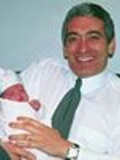
Virginia Center for Reproductive Medicine
11150 Sunset Hills Rd
100
Reston, VA 20190

Pregnancies Using Donor Eggs
By Fady I. Sharara, MD, FACOG
Virginia Center for Reproductive Medicine
More Infertility Articles
Pregnancies Using Donor Eggs
Delaying childbirth and age-related infertility are the most common causes of infertility in large cities in the US. A large proportion of infertility patients presenting to fertility clinics nowadays are in their late 30s and early to mid-40s, a time when the remaining eggs have “aged” significantly and are less likely to produce a healthy child.
For many infertile couples, egg donation is one of the only ways they will be able to experience the joys of parenthood. This offers women who are unable to produce their own healthy eggs a chance for conception. Some conditions that can be successfully treated using egg donation include premature ovarian failure, previous ovarian surgery, previous radiation or chemotherapy, genetic disorders, advanced age, and history of poor or inadequate response to previous fertility treatments. For these patients, in vitro fertilization (IVF) with donated eggs may be the best option to achieve a normal, healthy pregnancy.
The idea of using donated eggs may not be an obvious option to many infertile women. However, upon consideration, many women appreciate the opportunities it provides. Pregnancies derived from donated eggs allow both the female and male partners to have a biological connection to the developing baby. The male partner typically has a genetic connection if his sperm is used to fertilize the donated eggs. The female partner biologically influences the development of the baby by carrying the baby and controlling its nutritional needs. In addition, recipients can experience pregnancy, childbirth, and breastfeeding, which are not possible with other options such as adoption. IVF with donated eggs also allows a level of confidentiality that adoption does not. The recipient may choose whether or not to disclose the method of conception to the resulting child, other family members or friends.
Women donating their eggs are usually between 21-31 years of age. All egg donors who are recruited in our program undergo rigorous screening, which includes testing for infectious diseases, sexually transmitted diseases, genetic diseases, and exposure to illegal drugs. In addition, egg donors are screened for family histories, general and reproductive health, and psychological stability. The donor may be known to and recruited by the recipient (non-anonymous donation), or unknown to the recipient, having been recruited by the IVF-ET program (anonymous donation) or by a donor egg agency. Recipients are provided with descriptive, non-identifying information about prospective donors, and are able to choose a donor with whom they are most comfortable.
Fertility treatment with donated eggs involves IVF the donors ovaries are stimulated to produce multiple eggs, while the recipient takes hormonal medication to induce adequate development of the uterine wall. The donors eggs are extracted by a simple office procedure, and fertilized in the laboratory with sperm from the recipients partner.
After several days, a number of embryos (usually 1 or 2) are selected for transfer into the recipients uterus in the hopes of achieving a pregnancy. Any remaining embryos that appear healthy can be frozen for future use. Pregnancy rates are above 50% in most programs. For more information on the success rates of donor egg programs in the Washington area, please visit www.sart.org.
Other Articles You May Find of Interest...
- The Mighty Egg
- Empowering Your Fertility Journey: A Personalized Pretest Initiative Accessible Through Your Primary Doctor
- Grateful for the air we breathe
- Chinese Acupuncture For Infertility
- Medicinal Marijuana Hurts Fertility
- Navigating Infertility Challenges: How a Fertility Specialist in Frisco Can Help
- The Marvelous Fallopian Tubes

















